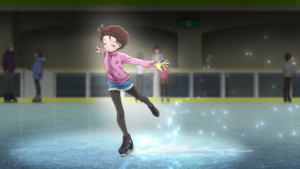Medalist
Short Synopsis: A young girl learns to figure skate against her mother’s wishes while her coach lives his dreams through teaching her.
Lenlo: Been a while since our last figure skating anime, only one I can remember was Yuri on Ice. Where that was all about the highest levels of competition though, big flash moves and Olympic level events, Medalist takes a more traditional, ground up approach. We get to see a girl learn the sport from the start, growing and learning the whole way. Meanwhile her teacher gets to live his dreams vicariously through her. And it’s that relationship that sets Medalist apart from other sports series for me. We’re not just following kids, highschoolers, and their naive “I will win at any cost” attitude like we so often do. Her coach is just as important as she is, in fact he’s the point-of-view character for basically the entire episode. His desire to see her succeed, to prove everyone wrong about it being too late to learn, to live that dream he gave up on in his youth, is just as important as her own story. And you know what? I bought it. I’m not sure if the production will keep up, if their dynamic will work for an entire series or what kind of development and growth they will go through, but I want to see what Inori and Tsukasa can do.
Potential: 60%
Mario: Let me start first by saying I believe Medalist has all the right ingredients to be a sleeper hit of this season, or at least to gather some passionate followers. This premiere does its job competently – introducing two lead characters who are different in personality and age but are passionate about figure skating, and laying a solid foundation for the girl Inori to be trained by Tsukasa. I’m not entirely sold on the whole ordeal, though. First, I found the mix between melodrama and comedy doesn’t really mesh well together. There are a few scenes, especially involving Tsukasa, that aim to lighten the mood right in the middle of a conflict, which gave me tonal whiplash. Also it tends to amp up its drama – Inori is on the verge of tears most of the time and I think the show will mine that. But most of all, as someone who has a high performance sports background, what sticks out to me – in a bad way – is Tsukasa’s lack of qualification. He is unprepared to take on the coach’s role and has no concrete plan whatsoever to coach his new pupil. The way he screams to make her mother accept his proposal, for example, is a big no-no in real life. On the positive spectrum, I quite enjoy the animation plus the choreography (not flashy, but does its job), and the chemistry between the two leads is solid. Yep, so despite some minor issues, I still think we ended up with a winner here.
Potential: 50%
Hana wa Saku, Shura no Gotoku
Short Synopsis: After much convincing, a shy first year high schooler agrees to join the broadcasting club.
Wooper: Hana wa Saku is one of the only winter shows for which I had any real expectations, mostly on the basis of the source manga’s authorship (it’s by the author of the Hibike Euphonium novels). Unfortunately, it didn’t live up to those hopes – this episode was about as simple as premieres get when it comes to high school club anime. In the words of sophomore student Mizuki, “Where there’s a flower, you water it. Where there’s a promising first year student, you recruit her.” And that’s just what Mizuki does, asking protagonist Hana (whose name means “Flower,” get it?) over and over to join the broadcasting club, sensing that she has a knack for their style of poetry recitations. The way the entire episode hinges on the question of whether Hana will accept her invitation is too simple by half. After expressing a dislike of her own lack of self-confidence during a sleepover with Mizuki, her doubts about her own abilities are washed away after the older girl demands that she join the club once more, but this time with picturesque sun rays peeking through the clouds. Even the inflexible ferry schedule that would have prevented Hana from joining gets adjusted for the sake of her membership. The direction dramatizes some of the recitations with visual metaphors like train tracks and grasping vines, which is nice, but it’s not enough to elevate the rest of this episode.
Potential: 20%
From Bureaucrat to Villainess
Short Synopsis: A 52 year old salaryman is reincarnated as the villainess of an otome game.
Wooper: The most notable moment of Akuyaku Reijou Tensei Ojisan, at least for me, was one that made me feel totally out of step with modern anime. In a flashback to the main character’s life prior to his reincarnation, he spoke with his otaku daughter about ringlets being the preeminent hairstyle for shoujo antagonists. To prove his point, he mentioned Glass Mask, Aim for the Ace, and Candy Candy, to which his daughter replied, “Sorry, Dad. Those references are way too old for me to get.” I’ve never related more strongly to a half-century-old salaryman than I did to this one in that moment – thankfully, he spends most of this premiere failing upwards in one of his daughter’s otome games, rather than getting roasted for his old-ass taste in anime. The good social instincts he developed after three decades of office work allow him to effortlessly rehabilitate the image of the ringlet-haired villainess whose body he now inhabits, and he gets to enjoy the benefits of youth once more. There’s even a charming scene during an academic lecture where he celebrates his improved vision and page-turning abilities. I’m not an expert on this subgenre, but this is one of the better otome-themed premieres I’ve seen in nearly eight years of doing first impressions. It won’t make my winter watchlist (at this rate, almost nothing will), but it’s not bad at all.
Potential: 30%
The post Winter 2025 Impressions: Medalist, Hana wa Saku, Shura no Gotoku, From Bureaucrat to Villainess appeared first on Star Crossed Anime.




